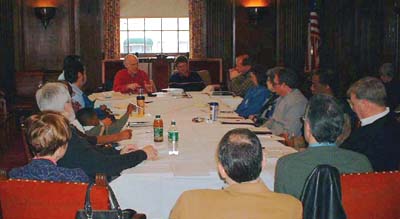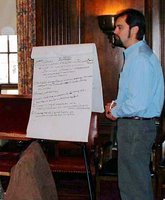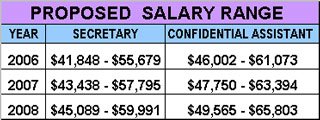Council Gets Earful On Senior Center, Chief Leave Protest
When it was time for the public to speak, Senior Center President Charles Nelson came forward to demand answers on the status of plans for a new senior center building.
“I’m really dismayed,” he said, noting a building committee meeting with acting Public Works Director Jennifer Wenson Maier on Feb. 24 yielded no insight into the new administration’s plans to follow through on campaign promises for a new building.
Nelson said new Mayor Sharon Robinson-Briggs suggested last month that the seniors should move to the old Plainfield Armory, a notion the seniors rejected about eight years ago.
“My people are frustrated,” Nelson said.
For their part, Wenson Maier and acting City Administrator Carlton McGee claimed equal frustration in not being able to gather facts about the history of the center project.
“I went to the meeting with question marks,” Wenson Maier said, while McGee referred to a trail of “bread crumbs” on the new center proposal.
McGee criticized the borrowing of money in November for the project because the city is paying interest on the debt and no construction is going on. Wenson Maier said plans were incomplete.
An early proposal set the cost for a new center at $1.7 million , but it ballooned to $4.3 million by the time the city went out for notes last year to fund it. The debt is in place, officials said, but there has been no action to start building.
Robinson-Briggs arrived midway through the discussion and said Wenson Maier came back from the Feb. 24 session “with nothing.”
Robinson-Briggs is scheduled to meet with the seniors March 7 and stated at a Feb. 18 joint meeting of land use boards that she intends by then to have a plan ready for the senior center.
In another emotional issue, Flor Gonzalez, president of the Latin American Coalition, said a Feb. 24 protest in support of Police Chief Edward Santiago was denied permission, despite the fact that one against the chief earlier in the week was allowed to go on. Robinson-Briggs put Santiago on administrative leave Feb. 15 pending outcome of a lawsuit the chief filed against the city and various officials in August 2005. The mayor said she did so on advice of legal counsel.
Gonzalez spoke fervently of the need for understanding among all ethnic groups, but also questioned how her group was denied a right apparently given to others.
Gesturing at the interior of City Hall Library, Gonzalez said, “ This house belongs to all of us.”
In response, Acting Public Safety Director Martin Hellwig said he had mistakenly told Gonzalez she had to wait two weeks to hold a protest. But he said after he found out the protesters had a right to express themselves, he met with the small group carrying placards Friday.
“I take responsibility for giving the wrong information,” Hellwig said, but he also cited issues of traffic safety related to the group’s plan to march from Police Headquarters to City Hall.
After Gonzalez also alleged that a police officer beat a Hispanic, among other recent crimes in the city, council members asked police officials to look into the allegation.
Councilwoman Linda Carter asked for an investigation and assurances that all police officers are properly trained in dealing with the public.
--Bernice Paglia
KEYWORDS: senior center, Latinos, police





